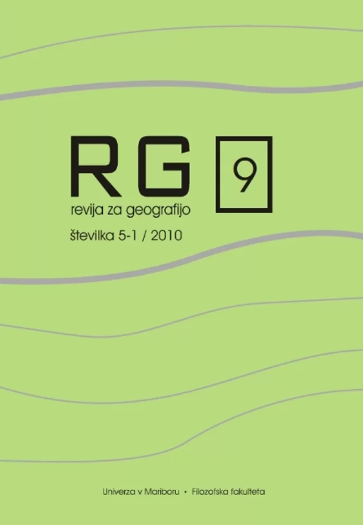Ekološko kmetovanje: Rešitev krize v kmetijstvu ali "nov" trend zdravega prehranjevanja? Pregled francoskih in britanskih kmetov
DOI:
https://doi.org/10.18690/rg.5.1.4010Ključne besede:
diverzifikacija kmetij, pluriaktivnost, ekološko kmetovanje, mlekarstvoPovzetek
V zadnjih letih se je trg ekološkega kmetovanja močno povečal zaradi zaskrbljenosti glede kakovosti hrane in okoljskih vprašanj. Ekološka hrana je za potrošnike precej privlačna in se pogosto povezuje s kakovostnimi, zdravimi in naravnimi izdelki v nasprotju z bolj predelano in umetno konvencionalno hrano. Vendar so kmetje nad tem konceptom manj navdušeni. V tem prispevku, ki je nastal na podlagi ankete, opravljene z mlekarji na dveh mlekarskih območjih v Franciji (januar 2000) in Združenem kraljestvu (julij 2002), je pregledan odnos kmetov do ekološkega kmetovanja. Le manjši del kmetov je bil naklonjen ekološkemu kmetovanju, drugi pa so imeli pomisleke glede ekološkega kmetovanja, saj je njegov koncept v nasprotju z njihovim prepričanjem: kmet mora pridelovati hrano za narod.
Prenosi
Literatura
Bordeleau, G., Myers-Smith, I., Midak, M., Szeremeta, A. 2002: Food Quality: A comparison of organic and conventional fruits and vegetables. Ecological Agriculture. Den Kongelige Veterinœr – og Landnohojskole.
Brandt, K. 2007: Organic Agriculture and Food Utilization. Paper presented at Organic Agriculture and Food Security. FAO, Rome.
Briz, T., Ward, R. 2009: Consumer awareness of organic products in Spain: An application of multinominal logit models. Food Policy, 34, 3, p. 295-304. https://doi.org/10.1016/j.foodpol.2008.11.004
DEFRA 2009: Farming: organic farming. http://www.defra.gov.uk/foodfarm/growing/organic/index.htm (September 2009).
European Commission 2005: Organic Farming in the European Union Facts and Figures. Commission Europeenne. Bruxelles.
Gilg, A., Battershill, M. 1998: Quality farm food in Europe: a possible alternative to the industrialised food market and to current agrienvironmental policies: lessons from France. Food Policy, 23, p. 25–40. https://doi.org/10.1016/S0306-9192(98)00020-7
Hall, A., Mogyordoy, V. 2001: Organic farmers in Ontario: an examination of the ‘conventionalisation’ debate. Sociologia Ruralis, 41, p. 399-422. https://doi.org/10.1111/1467-9523.00191
Hughner, R., McDonagh, P., Prothero, A., Clifford, J., Shultz, I. J., Stanton, J. 2007: Who are organic food consumers? A compilation and review of why people purchase organic food. Journal of Consumer Behaviour, 6, p. 1–17. https://doi.org/10.1002/cb.210
Ikerd, J. 1993: Two related but distinctly different concepts: organic farming and sustainable agriculture. Small Farm Today 10 (1), p. 30-31.
Ilbery, B. 1998: The Geography of Rural Change. Harlow. Longman.
Ilbery, B.; Kneafsey, M. 2000: Producer constructions of quality in regional speciality food production: a case study from south west England. Journal of Rural Studies, 16 (2), p. 217-230. https://doi.org/10.1016/S0743-0167(99)00041-8
Lampkin, N. 1994: Organic farming: sustainable agriculture in practice. In: Lampkin, N., Padel, S. (edt.). The Economics of Organic Farming: An International Perspective. CABI, Oxford.
Lea, E., Worsley A. 2008: Australian consumers’ food-related environmental beliefs and behaviours. Appetite, 50 (2-3), p. 207-214. https://doi.org/10.1016/j.appet.2005.07.012
MacCormack, H. 1995: Sustainable agriculture versus organic farming. In: Bird, Bultena, Gardner (edt.), What is Sustainable Agriculture? Planting the Future: Developing an Agriculture that Sustains Land and Community. Iowa State University Press. https://doi.org/10.1016/S0308-521X(00)00060-3
Magnusson, K., Arvola, A., Hursti, U., Aberg, L., Sjoden, P. 2003: Choice of organic foods is related to perceived consequences for human health and to environ-mentally friendly behaviour. Appetite, 40 (2), p. 109-117. https://doi.org/10.1016/S0195-6663(03)00002-3
Marsden, T., Banks, J., Bristow, G. 2002: The social management of ruralnature: understanding agrarian-based rural development. Environmental and Planning A, 34, p. 809-825. https://doi.org/10.1068/a3427
Reed, M. 2009: For whom? – The governance of organic food and farming in the UK. Food Policy, 34, p. 280-286. https://doi.org/10.1016/j.foodpol.2009.03.003
Rigby, D., Young, T., Burton, R. 2000: Why do farmers opt in or opt out of organic production? A review of the evidence. Symposium paper presented at the 2000 Agricultural Economics Society Conference, Manchester.
Roitner-Schobesberger, B., Darnhofer, I., Somsook, S., Vogl, R. 2008: Consumer perceptions of organic foods in Bangkok, Thailand. Food Policy, 33 (2), p. 112-121.
Scofield, A. 1986: Organic farming: the origin of the name. Biological Agriculture and Horticulture, 4, p. 1-5. https://doi.org/10.1080/01448765.1986.9754481
Sirieix, L., de Abreu, L., Aico, M., Kledal, P. 2007: Comparing organic urban consumers in developing and developed countries: First results in Brazil and France. Paper presented at AIEA2 and SOBER international conference, Londrina, Parana-Brazil.
Soares, L., Deliza, R., Oliveira, S. 2008: The Brazilian consumer's understanding and perceptions of organic vegetables: a Focus Group approach. Ciênc. Tecnol. Aliment. 28 (1), p. 241-246. https://doi.org/10.1590/S0101-20612008000100034
Soil Association, 2009: Organic market report 2009. http://www.soilassociation.org/web/sa/psweb.nsf/organic_market_report_2009.pdf (16th April 2009).
Willer, H., Yussefi, M. 2001: Organic Agriculture Worldwide: Statistics and Future Prospects, Stiftung Okologie and Landbau. Bad Durkheim.
Zakowska-Biemans, S. 2007: Consumers and consumption of organic food in Central and Eastern European new member states of the European Union. Poster presented at 3rd QLIF Congress: Improving Sustainability in Organic and Low Input Food Production Systems. University of Hohenheim, Germany.
Prenosi
Objavljeno
Številka
Rubrika
Licenca
Avtorske pravice (c) 2010 Annabelle Boulay

To delo je licencirano pod Creative Commons Priznanje avtorstva 4.0 mednarodno licenco.
